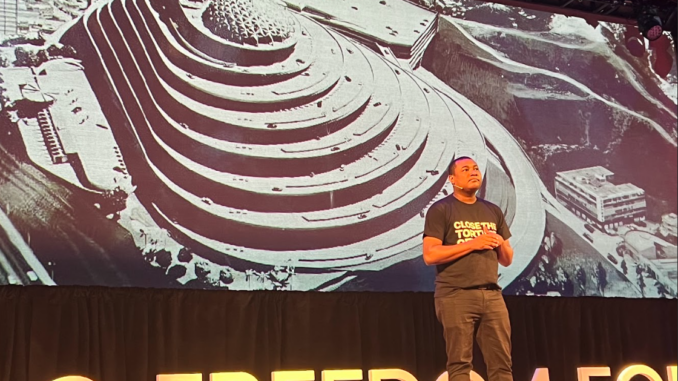
By Kate Dempsey
The Vanguard had the honor of being invited to the annual Oslo Freedom Forum held in New York City on Sept. 28, an event dedicated to promoting human rights initiatives and highlighting the work of activists, humanitarians, and innovators globally. With this year’s theme being “Creating Solidarity,” the forum presented activists fighting authoritarian regimes, using their voices to power change. The Vanguard had the incredible honor of interviewing one of these voices.
Víctor Navarro never could have imagined himself as a political prisoner, tortured for helping others. Navarro suddenly went from a university student doing social work, helping young people off the streets, to being arbitrarily detained in Venezuela’s most notorious prison, “El Helicoide.” In Venezuela, offering opportunities can be considered a crime; the result for helping is state-sanctioned torture.
He spent five months in El Helicoide. Five months without seeing the sun. Five months of physical and psychological torture with his companions. The Bolivian National Intelligence Service (SEBIN), the political police that obey Venezuela’s President Nicolás Maduro, made sure to dehumanize the prisoners. Navarro was no longer Navarro; he was prisoner and terrorist number 25-510-806.
Upon being released, Navarro dedicated himself to fighting for those still trapped in El Helicoide. Along with 30 of his companions, the organization “Voces de la memoria” [translated to “Voices of memory” in English] was born. They created “Realidad Helicoide” [Helicoide Reality], a virtual-reality experience that takes users directly into El Helicoide, exposing President Maduro’s torture center to raise awareness about their crimes.
“The project recreates how a political prisoner lives in the conditions in which a political prisoner is in the country, and what we seek to use technology to defend human rights and make visible what is still happening today because in Venezuela, there are at least 300 political prisoners today in the country,” Navarro told The Vanguard.
The virtual reality experience takes users directly into El Helicoide, witnessing the brutality that political prisoners face at the hands of SEBIN. The decision to use virtual reality as the outlet for exposing the torture, according to Navarro, is to express what might otherwise be difficult to put into words.
“It is the best way to generate empathy with other people. It is a technology of being able to explain what cannot be explained in words because it is no longer the same as you telling your story to someone in the same way being in the place where a political prisoner is,” Navarro said.
Realidad Helicoide was brought to New Yorkers at Times Square on Sept. 19, strategically coinciding with the United Nations convening in New York for their General Assembly meeting. The contrast was stark, even as the United Nations recently released a report detailing crimes against humanity in the country.
“For us, it was very important that the leaders of the world, while they are talking about justice, freedom, democracy here in New York, we show in one of the busiest places in the world that it is also important that they talk about torture, that it is also important that they talk about the autocracies,” Navarro said. “We did it with the intention to let people talk about autocracies. We did it with the intention that this would be done within the framework of the General Assembly.”
The United States has condemned President Maduro, accusing him of orchestrating illegitimate elections that allow him to remain in power, and characterizing Maduro’s government as a “regime” and a threat to Venezuela’s democracy. However, Navarro emphasized that more needs to be done to hold Maduro accountable, as many governments have maintained their diplomatic ties with the country.
“Governments do not want to know what is happening in Venezuela because there are economic relations, mainly ideological and political, where it is convenient for them to have a relationship with Venezuela,” Navarro said. “The Biden administration must recognize that Maduro’s government is a dictatorship at the end of the day.”
Venezuela entered an economic crisis soon after President Maduro came to power in 2013. The country experienced hyperinflation in 2014 when the bolivar, Venezuela’s official currency, inflation rate increased to 69%, the highest in the world, according to the United Nations Economic Commission for Latin America and the Caribbean. A one million bolivar depreciated to as little as 25 cents to the American dollar, and continues to depreciate in 2023.
At the time the Realidad Helicoide debuted in New York, the city continues to experience a migrant crisis of Central and South Americans fleeing their countries, with Venezuelans making up the largest group of the migrants, according to The New York Times. Navarro added that El Helicoide could potentially increase “the acceptance of the migrants and people understanding the plight of Venezuelans.”
As Navarro told the crowd at the Oslo Freedom Forum his story, he emphasized that the horrors he’s endured at the hands of El Helicoide do not define him. He is defined by what he has decided to do with the trauma. Realidad Helicoide exists because he persisted, and he can now help other political prisoners do the same.
“I know I’m not a terrorist, nor am I number 25-510-806,” Navarro said. “Above all, I am what I decide to do with what I’ve lived. We will not be silent. I am not a number, I am Víctor Navarro.”
The Vanguard would like to extend a special thanks to Alvaro Piaggio for serving as the translator, Olivia Young as a co-interviewer, and the Oslo Freedom Forum for the invitation.
